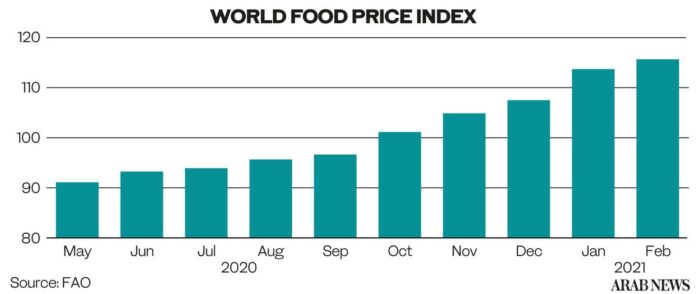LONDON: Prices are surging across the Arab world as food and fuel costs rapidly erode purchasing power.
Some analysts expect to see an acceleration in inflation in many countries including the US, as consumers start to spend heavily on big purchases.
A rise in consumer prices in the US and Europe could also spell bad news for Middle East nations as the cost of imports increases, while some such as Lebanon and Syria are already being pummeled by the collapse of their currencies which has exaggerated inflationary pressures.
“We do see a pickup in underlying inflationary pressure in the GCC over coming months from the higher fuel and food prices,” Monica Malik, the chief economist at Abu Dhabi Commercial Bank, told Arab News.
The rollout of vaccines worldwide and the gradual easing of restrictions in some major economies is opening the floodgates of consumer spending. This is already beginning to show in rising credit card spending according to Bank of America which sees US consumer spending already up by about 10 percent on a year ago.

Rising inflationary concerns in the world’s biggest economy form the backdrop of Wednesday’s key meeting of federal reserve officials as they look forward to potential economic growth of 6.2 percent this year, the highest rate in 37 years.
Earlier this month, the UAE revealed it was considering price controls on some foods such as chicken and milk as global food prices climbed to their highest level in six years.
“We are studying this very carefully and we may need some adjustments,” said Mariam Almheiri, the country’s minister of state for food and water security.
Data published by Saudi Arabia’s statistics body last week showed that while overall inflation eased to 5.2 percent in February, food and beverage prices remained elevated, recording the highest annual increase at 11.2 percent. Signs are emerging of price hikes in other Gulf states with Oman becoming the next focus of attention as it prepares to introduce value added tax next month.
Shoppers have been paying more for many food items over the last year as producers and supermarket groups capitalized on rising demand during the pandemic by boosting profit margins. Regional food producers including Saudi Arabia’s Savola have increased margins over the last year amid rising consumer demand.
For the Gulf states at least, inflationary pressures are coming off a low level, but for other countries in the region including Lebanon and Syria, there is no such relief.
“For most of the GCC countries, inflation is starting from a relatively weak level with many seeing an oversupply in housing,” said Malik. “In the case of Saudi, the inflation rate should moderate sharply in the second half of the year as the impact of the hike in VAT drops out of the annual data. Oman, on the other hand, should see a greater strengthening in inflation from April with the introduction of VAT.”
Syria this week raised petrol prices in government-held territory by more than half as the Syrian pound hit new lows.
“Many ordinary Syrians as well as businesses used to keep accounts in US dollars in Lebanon, and lost access to them in autumn 2019 as the financial crisis in Lebanon accelerated. Lack of economic growth, high unemployment rates, rapid currency devaluation, shortage of foreign-exchange reserves, and the COVID-19 pandemic are among many factors contributing to the current situation,” Monika Tothova, an economist at the UN’s Food and Agriculture Organization (FAO), told Arab News.
Syria’s Central Bureau of Statistics reported an average inflation rate of 200 percent in 2020 compared to 2019, with goods inflation reaching 300 percent.
The FAO estimates that some 12.4 million people (60 percent of the overall population) are now “food insecure,” 5.4 million more than at the end of 2019.
In neighboring Lebanon, prices are also rising rapidly as the Lebanese pound hit new lows against the dollar this week. The situation is predicted to get even worse.
“In the coming months, as the Central Bank is running out of foreign exchange reserves, the expected removal of provision of subsidized exchange rate to import food, essential medicines, and fuel (and some other items) is likely to lead to a further increase in the price of basic goods,” said the FAO’s Tothova. “Combined with lack of economic growth and employment opportunities, the livelihoods of poor Lebanese and refugee households will be affected.”

Saudi inflation rate falls to 5.2% in February, reflects VAT hike for eighth monthTurks grapple with poverty as inflation bites

